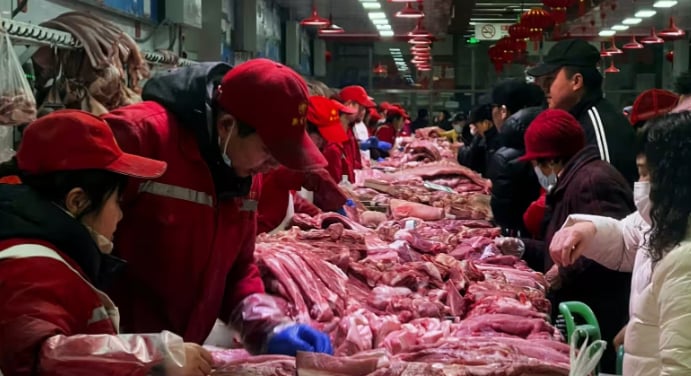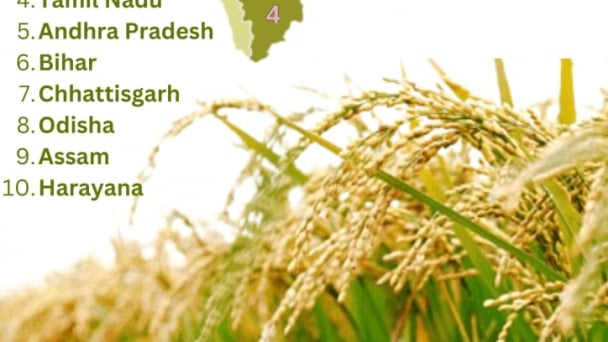June 23, 2025 | 07:53 GMT +7
June 23, 2025 | 07:53 GMT +7
Hotline: 0913.378.918
June 23, 2025 | 07:53 GMT +7
Hotline: 0913.378.918

Dalian pork futures are down around 40% from their most recent peak in October 2022. Photo: Reuters.
These facilities were granted eligibility under a 2020 trade agreement, but with that deal expiring, their registrations remain uncertain.
The lapse could impact billions in U.S. meat exports at a time of strained trade relations. Industry leaders have pushed for renewals, but approvals remain unconfirmed, raising concerns over market losses. The U.S. Meat Export Federation reported that U.S. beef exports were valued at over $415 per fed steer or heifer, while pork exports totaled more than $66 per head. The market is valued at about $5 billion.
Losing access to China would be another hit to American farmers after Beijing imposed retaliatory tariffs on $21 billion worth of U.S. agricultural goods, including 10 percent duties on pork, beef, and dairy imports.
Beijing requires food exporters to register with customs, and registrations for nearly 1,000 beef, pork, and poultry plants — including some owned by Tyson Foods and Cargill Inc. — are set to expire Sunday, according to U.S. Department of Agriculture records and Chinese customs data. This accounts for about two-thirds of registered plants.
China has not responded to repeated U.S. requests for renewal, which the USDA said in a report last week could violate obligations under the Phase One trade deal. Some 84 plant registrations lapsed in February, and while affected shipments are still clearing customs, uncertainty remains.
“The risk involved in shipping product with a looming expiration date is high,” Joe Schuele, spokesperson for the U.S. Meat Export Federation, said in the Reuters report.
Not all plants are affected — several hundred have received renewals until 2028 or 2029, a senior diplomat in Beijing said. The U.S. was China’s third-largest meat supplier last year, behind Brazil and Argentina, accounting for 590,000 tons or 9 percent of total imports.
Signed in 2020, the Phase One trade deal aimed to end the U.S.-China trade war, with China pledging to boost purchases of U.S. goods by $200 billion over two years — a target it did not meet. That year, 1,124 U.S. meat processing plants were registered for export to China. Today, 1,842 facilities are certified, but nearly half could lose access if registrations lapse.
China is required to update its approved plant list within 20 days of receiving updates from the USDA’s Food Safety and Inspection Service, according to the Meat Institute, an industry group. Whether the delays constitute a violation remains unclear.
The U.S. Meat Export Federation estimates the impact of lapsed licenses could total $4.13 billion for beef and $1.3 billion for pork. Loss of access would particularly hurt exporters of items like chicken feet and pork offal, which have limited domestic demand.
(Reuters)

(VAN) Last week, the U.S. Department of Agriculture (USDA) released its June World Agricultural Supply and Demand Estimates (WASDE), raising projections for both Indian rice production and U.S. rice imports for the 2025/2026 marketing year.
/2025/06/17/2344-1-131758_261.jpg)
(VAN) Amid tariff risks and growing trade barriers in the U.S. market, Australia is emerging as a promising destination to sustain the growth momentum of Vietnam's shrimp exports.
/2025/06/17/2013-1-nongnghiep-112009.jpg)
(VAN) This notable growth trend reflects the global taste for fresh, nutritious fruits and the expanding use of lychees across various sectors.

(VAN) The political and cultural insulation of Japan’s beloved grain is falling apart, and experts warn the country’s relationship with the staple will have to adapt.

(VAN) Noting risks, report examines impacts of avian influenza, changing trade patterns since 2022, fish fraud, and shipping industry’s net-zero goals.

(VAN) Mr. Tran Quang Bao, General Director of the Forestry and Forest Protection Department, met and worked with the International Wood Products Association to promote cooperation in the field of timber trade.

(VAN) China's outbound shipments of rare earths in May jumped 23% on the month to their highest in a year, though Beijing's export curbs on some of the critical minerals halted some overseas sales.